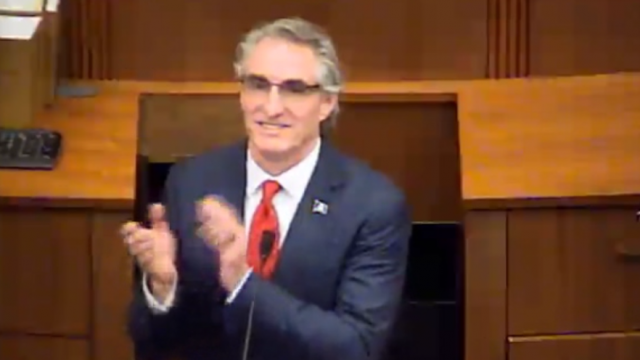Video: Burgum Plugs Bing, Promotes Education, and Promises End to Property Tax Buy Downs During State of the State

Governor Doug Burgum delivered the first State of the State address of his term in office to lawmakers today.
Here’s the full video, which isn’t really all that long and would be worth your time to watch. I put some of my thoughts below:
[fcc_jw_player key=”sP2Qdshw”]
An energetic new tone
“The new governor—though he projects an image of youth and vigor—is among the oldest to serve as governor,” my colleague Mike Jacobs wrote of Burgum today. “Only three, including Burgum, had passed 60 when they took office: Jack Dalrymple, the most recent former governor, who was 62; Eli C.D. Shortridge, the third occupant of the office, who was 63; and Burgum, who as of today is 156 days past his 60th birthday.”
That was surprising to me. I hadn’t realized Burgum is as old as he is. I would have guessed that former Governor Dalrymple was significantly older than Burgum, and that has everything to do with personality. Burgum is energetic and enthusiastic, and that comes through in everything he does. Dalrymple, nobody’s idea of a great orator, often gave the opposite impression.
Burgum’s demeanor, his energy, is a pebble thrown into the pond of state government. It’s going to see what impact the ripples from it have.
What was with the Bing plug?
A big part of what Burgum is famous for is his work in the tech industry. He started a company, sold it to Microsoft, and then became an evangelist for techno-entrepreneurship after ending his time as an executive. So it was no surprise today when Burgum started touting tech start ups in his speech today. He name-checked Uber and Airbnb, and in a bizarre reference which came across almost like a product placement he plugged Microsoft’s woeful search engine Bing.
It all came across as forced. The Bing reference, which I think was supposed to be a laugh line alluding to Burgum’s past relationship with Microsoft, struck me as borderline inappropriate.
[mks_pullquote align=”right” width=”300″ size=”24″ bg_color=”#ffffff” txt_color=”#000000″]He name-checked Uber and Airbnb, and in a bizarre reference which came across almost like a product placement he plugged Microsoft’s woeful search engine Bing.[/mks_pullquote]
The tech stuff is Burgum’s long suit. I expected him to weave it into his speech a little better. I mean, referring to a smart phone as a super computer is true and accurate and everything, but not exactly a visionary observation today. In fact, in 2017, it comes of as patronizing.
Reinventing education
After the stilted techno babble, Burgum did better with education. He said the foundations of North Dakota’s education system are based on the concept of a one room school house where a teacher transfers knowledge to students with the aid of a few books. He said that while we have more books today (and though he didn’t mention it our schools have no shortage of computers and gadgets) little has changed with our education philosophy. He talked about moving education out of the classroom, and beyond the fall/winter/spring months, and turning it into a lifetime endeavor.
“We can’t prepare our kids for the 21st century using a 19th century model,” he said.
Which sounds great. I’m interested – excited, even – in hearing how he plans on actually, you know, doing it.
“It’s not free money”
This was the part I was really excited about.
Anyone who follows politics in North Dakota for long enough will inevitably find themselves in the middle of a debate over property taxes. There is perhaps no issue in our state that is more consistently at the top of citizen concerns than property taxes.
Over the last several legislative sessions the state’s approach to addressing concerns over property taxes has been to try and buy down local spending. Which has been frustrating. Transferring local spending obligations into the state budget is not tax relief. Many, including this observer, have been saying that for years.
Today Burgum said he wants to stop it. “It’s not free money,” he said, calling the state’s obligation to local spending an “unsustainable expenditure line.”
He said the state buy downs “act as a subsidy” to local spending and that the real solution is to “reduce the cost of local government.” He invoked his Main Street Initiative as a way to address that issue. “How we design and grow our cities has a huge impact on property taxes,” he said.
He’s right. This could be big. The only problem is, now that the state has been buying up local spending, what happens when they stop? Massive property tax hikes?
I don’t think that’s going to be palatable to anyone.
It’s a sticky wicket.




